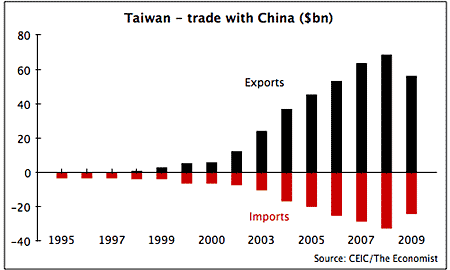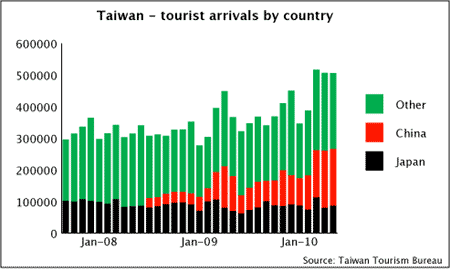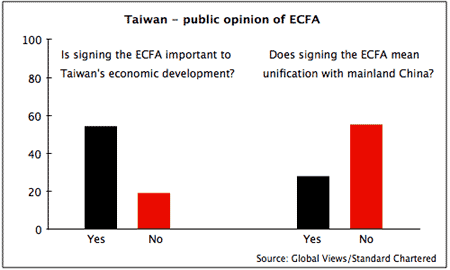Chinese bribery is great news for Taiwan
After sixty years, Mainland China and Taiwan have signed an economic co-operation agreement. The pact is crucial to Taiwan's future, no matter what China's ulterior motives may be. Cris Sholto Heaton looks at what the deal means, and examines the best ways to invest in Taiwan.

Get the latest financial news, insights and expert analysis from our award-winning MoneyWeek team, to help you understand what really matters when it comes to your finances.
You are now subscribed
Your newsletter sign-up was successful
Want to add more newsletters?

Twice daily
MoneyWeek
Get the latest financial news, insights and expert analysis from our award-winning MoneyWeek team, to help you understand what really matters when it comes to your finances.

Four times a week
Look After My Bills
Sign up to our free money-saving newsletter, filled with the latest news and expert advice to help you find the best tips and deals for managing your bills. Start saving today!
Sixty years is a long time to wait for a free-trade deal. But with China and Taiwan nothing is ever straightforward. Last week, the two sides finally signed a long-awaited 'economic co-operation framework agreement (ECFA)'.
Despite having a name designed to make your eyes glaze over, this is quite a big deal. It's the latest and largest step in a story I've been flagging up for some time the transformation of Taiwan's economy.
Taiwan has already evolved once, from a poor rural economy into a leading technology centre. Now it could be set for another huge shift.
MoneyWeek
Subscribe to MoneyWeek today and get your first six magazine issues absolutely FREE

Sign up to Money Morning
Don't miss the latest investment and personal finances news, market analysis, plus money-saving tips with our free twice-daily newsletter
Don't miss the latest investment and personal finances news, market analysis, plus money-saving tips with our free twice-daily newsletter
And all with the help of a country that doesn't even recognise its existence
China and Taiwan's difficult history
Before talking about the ECFA and what this means for Taiwan, it's vital to understand the politics. Here's a quick recap. In 1949, the Kuomintang (KMT) government of Chiang Kai-shek lost the Chinese civil war against Mao's communists. They fled to Taiwan.
More from MoneyWeek Asia
At that point, the two sides of theTaiwan Straitdiverged politically. The mainland suffered under decades of misrule, including the mass deaths and destruction of the Great Leap Forward and the Cultural Revolution.
Taiwan instead took a capitalist route. It became one of the 20th century's great development success stories, and gradually moved from a military dictatorship to a fairly robust and outspoken democracy.
Throughout this period, the mainland government has continued to regard Taiwan as a breakaway province. They believe it should be reunited with the rest of the country as part of the People's Republic of China.
Meanwhile, Taiwan is officially the Republic of China and technically continues to claim the whole of the mainland. Neither side has ever officially viewed Taiwan and China as separate nations.
And this is how the situation remains today. Taiwan has de facto independence and the promise of military assistance from America if needed. Yet it's not actually recognised as an independent state by most governments or international bodies, although it has diplomaticrelations under various guises.
Meanwhile, China has threatened to invade if the island formally declares independence. Several hundred missiles are pointed across the strait, just to reinforce the point.
Yet trade carries on regardless
It's an extremely tricky situation and one of the big potential military flashpoints in Asia. But the two sides have conducted negotiations on and off over the years. And cross-straittrade has grown very strongly, to the point where China is now Taiwan's largest trading partner (see chart below).

Meanwhile, Taiwan is one of the largest sources of foreign direct investment into China. Many of the low-cost Chinese factories making goods for export, especially in electronics, are owned by Taiwanese business.
So business links between the two have been growing ever stronger despite the many restrictions on trade and investment that remained in place. For example, it was only two years ago that regular direct flights between the two began; previously travellers were forced to route via Hong Kong, adding several hours to the journey.
Progress has been slower than it might have been. That was down to the relatively anti-China stance of Chen Shui-bian and the Democratic People's Party (DPP) between 2000 and 2008.
But since Ma Ying-jeou of the KMT won the presidency in 2008, relations have been improving. The ECFA is the latest stage of that.
A crucial deal for Taiwan's future
So what does this trade deal do? It means tariffs on several hundred items should be cut to zero over the next two and half years. It also opens a number of service sectors for investment. This will deliver benefits for some Taiwanese firms, giving them better access to the mainland market than many regional rivals.
More importantly, this should be just the first of a series of deals. If Taiwan ends up with virtually free access to China's markets, that would be great news for its economy.
Second, Taiwan hopes that signing this deal will make it easier to strike deals with other countries, who have held back in the past for fear of annoying China. With bilateral trade agreements spreading across Asia, the Taiwanese government views this as a priority. If the ECFA is going to make it possible, we should soon see some evidence of it.
Third, it's a sign of improving relationships between the two. Like the rest of Asia, Taiwan is only going to become ever more economically dependent on mainland China. And while US military power protects the island for now, that may not be true in a few decades time. So Taiwan needs to arrive at some sort of understanding with the mainland in the long run. Working out a compromise that leaves Taiwan effectively independent seems the soundest idea.
Bribery can be welcome
Of course, China's goal here is to buy favour with the Taiwanese population. That's why the ECFA delivered far more to Taiwan than to China, removing tariffs on twice as many goods and opening up more key service sectors.
Again, these concessions are just the start. If all goes well, these deals could result in a significant amount of investment in Taiwan in years to come. That would be a major turnaround. Over the last few years, the island has seen a substantial outflow of capital.
Expert tips & advice for investing in Asia! Claim your FREE guides from MoneyWeek that include:
- How to go about investing to Asia
- Which brokers to use to buy foreign shares
Foreign direct investment that formerly went to Taiwan is now going to the mainland. Taiwanese firms invest in new factories there, rather than at home. That has hit jobs and wages. Successful Taiwanese businessmen who made money abroad have tended not to bring it home, while residents have chased more exciting investments elsewhere.
But now China is likely to push state-controlled firms to invest in Taiwan. That closer link with the mainland will in turn tempt both Taiwanese and foreign firms to invest more in skilled work such as research and development, serving the mainland's lower-cost production base, and in facilities such as logistics to profit from better trade ties.
Time to develop the service sector
And China will also direct spending to Taiwan in other ways. Tourist numbers from the mainland have risen sharply since restrictions were lifted in 2008. They exceeded the number of Japanese tourists for the first time earlier this year, as the chart below shows.

Higher-end services firms could be well-positioned to benefit. For example, medical firms could both set up in business on the mainland and offer medical tourism trips to Taiwan.
There's a lot of scope to develop Taiwan's service economy. One trivial example there's a real shortage of decent, reasonably-priced modern hotels. I've sometimes stayed in places that seem to have been plucked straight from a 1970s English seaside town and dropped in the middle of Taipei. Now that mainland visitors are flocking to the island, several international hotel chains are making plans to invest there.
Then there's real estate. After decades of industrialisation, Taiwan is cleaning up its environment, whereas the mainland will remain polluted for years to come. That should make property on the island extremely attractive to wealthy mainlanders. And on the commercial side, the more Taiwan becomes integrated with China through trade and R&D links, the more demand there will be for office, industrial and logistical space.
Of course, the prospect of Taiwan becoming more economically dependent on China is politically complicated. The majority of the Taiwanese population seem to favour the trade deal. They don't regard it as a threat to independence (see chart below).

However, the DPP and a substantial minority of voters oppose it. Several tens of thousands protested against the signing. Their concerns are understandable you have to recognise China's move for what it is: bribery. But supporters of the deal have no illusions about that; they simply believe that this still benefits Taiwan.
Don't expect miracles in the short term
This is a long-term story. We won't see major benefits from increased trade and investment overnight. Anyone investing in Taiwan should be aware that this is a small, trade-dependent economy subject to major swings.
As I'll discuss next week, there are signs the global economy may be slowing again even in China. Taiwan has recovered extremely strongly from the global recession. But I'm not sure the rapid growth will continue.
The central bank seems confident. It raised interest rates two weeks ago and has brought in new mortgage rules to cool the property market prices in Taipei are up 20% year-on-year. But I think there's a real chance that the economy could slow very sharply.
However, on a long-term view, I think the Taiwan-China links are potentially one of the most exciting stories in Asia. The easiest way to invest in the market is through an exchange-traded fund (ETF) such as the iShares or db x-trackers MSCI Taiwan funds. (The table below contains a full list of funds.)
The only thing to be aware of here is that the Taiwan market is extremely heavy in tech stocks, at around 60% of the index. At current valuations, I'd consider it a decent investment, given that the whole market should be lifted by any 'Taiwan rennaissance'.
But it's certainly not a pure play on any of the themes I've mentioned. Finding one is trickier unless you have direct access to the market. This is possible Taiwan is not closed to foreigners but few brokers offer it. Unfortunately, all the sector ETFs are listed in Taipei only at the moment.
Some companies are listed abroad through depositary receipts in London and New York. But the few that have any liquidity tend to be the biggest tech names such as Acer, Asustek and TSMC. Even mobile phone maker HTC, which is rapidly building its brand in the West, doesn't haveone.
The one exception is Chunghwa Telecom (NYSE:CHT). As the largest local telecoms firm in a mature market, it's mostly an income play, offering a yield of about 5.5% at present. But like a number of non-tech large caps, it also has substantial land holdings in good locations, meaning that it should benefit from any property and construction boom.
TABLE.ben-table TABLE {BORDER-BOTTOM: #2b1083 1px solid; BORDER-LEFT: #2b1083 1px solid; BORDER-TOP: #2b1083 1px solid; BORDER-RIGHT: #2b1083 1px solid}TH {TEXT-ALIGN: center; BORDER-LEFT: #a6a6c9 1px solid; PADDING-BOTTOM: 2px; PADDING-LEFT: 1px; PADDING-RIGHT: 1px; BACKGROUND: #2b1083; COLOR: white; FONT-SIZE: 0.8em; FONT-WEIGHT: bold; PADDING-TOP: 2px}TH.first {TEXT-ALIGN: left; BORDER-LEFT: 0px; PADDING-BOTTOM: 2px; PADDING-LEFT: 1px; PADDING-RIGHT: 1px; FONT-SIZE: 0.8em; PADDING-TOP: 2px}TR {BACKGROUND: #fff}TR.alt {BACKGROUND: #f6f5f9}TD {TEXT-ALIGN: center; BORDER-LEFT: #a6a6c9 1px solid; PADDING-BOTTOM: 2px; PADDING-LEFT: 1px; PADDING-RIGHT: 1px; COLOR: #000; FONT-SIZE: 0.8em; PADDING-TOP: 2px}TD.alt {BACKGROUND-COLOR: #f6f5f9}TD.bold {FONT-WEIGHT: bold}TH.date {FONT-SIZE: 0.7em}TD.first {TEXT-ALIGN: left}TD.left {TEXT-ALIGN: left}TD.bleft {TEXT-ALIGN: left; FONT-WEIGHT: bold}
Taiwan funds
| EasyETF TSEC Taiwan 50 | 0.60% | FR, FR$ |
| ComStage MSCI Taiwan | 0.60% | CH, DE, SW |
| DB x-trackers MSCI Taiwan | 0.65% | CH, DE, FR, GB, GB$, HK, IT, SE, SG, SW |
| Fubon FTSE Taiwan Technology | 0.44% | TT |
| Fubon MSCI Taiwan | 0.34% | TT |
| Fubon Taiwan Eight Industries | 0.44% | TT |
| Fubon Taiwan Finance | 0.44% | TT |
| Index IQ Taiwan Small Cap | 0.69% | US |
| iShares MSCI Taiwan | 0.74% | AU, CH, DE, FR, GB, GB$, IT, NL, US |
| Lyxor MSCI Taiwan | 0.65% | CH, FR, HK, IT, SG |
| P-Shares Taiwan Mid-Cap 100 | 0.48% | TT |
| P-Shares Taiwan Electronics Tech | 0.46% | TT |
| P-Shares S&P Taiwan Custom China Play 50 | 0.49% | TT |
| P-Shares MSCI Taiwan Financials | 0.50% | TT |
| P-Shares Taiwan Dividend Plus | 0.48% | TT |
| P-Shares TSEC Taiwan Non-Tech 50 | 0.50% | TT |
| P-Shares Taiwan Top 50 | 0.38% | HK, TT |
| Taiwan Fund | 1.63% | US:TWN |
| Taiwan Greater China Fund | 2.80% | US:TFC |
| Fidelity Funds Taiwan | 2.06% | $2,500 |
| JP Morgan JF Taiwan | 2.90% | $5,000 |
| Schroder ISF Taiwanese Equity | 2.51% | $1,000 |
| UBS EF Taiwanese Equity | 1.84% | € 500 |
| HSBC GIF Taiwan Equity | 1.83% | $1,000 |
| LionGlobal Taiwan | 1.65% | S$,5000 |
This article is from MoneyWeek Asia, a FREE weekly email of investment ideas and news every Monday from MoneyWeek magazine, covering the world's fastest-developing and most exciting region. Sign up to MoneyWeek Asia here
Get the latest financial news, insights and expert analysis from our award-winning MoneyWeek team, to help you understand what really matters when it comes to your finances.

Cris Sholt Heaton is the contributing editor for MoneyWeek.
He is an investment analyst and writer who has been contributing to MoneyWeek since 2006 and was managing editor of the magazine between 2016 and 2018. He is experienced in covering international investing, believing many investors still focus too much on their home markets and that it pays to take advantage of all the opportunities the world offers.
He often writes about Asian equities, international income and global asset allocation.
-
 Early signs of the AI apocalypse?
Early signs of the AI apocalypse?Uncertainty is rife as investors question what the impact of AI will be.
-
 Reach for the stars to boost Britain's space industry
Reach for the stars to boost Britain's space industryopinion We can’t afford to neglect Britain's space industry. Unfortunately, the government is taking completely the wrong approach, says Matthew Lynn